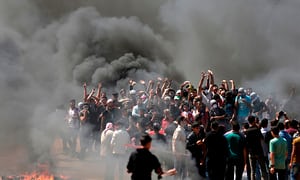Israel has warned Gaza’s residents that their lives will be in danger if they take part in a mass rally planned to protest against the opening of the US embassy in Jerusalem later on Monday.
Anger over Donald Trump’s December declaration on the embassy helped ignite a six-week movement in which residents of the enclave have gathered near the frontier, with groups throwing stones and burning tyres.
Israeli snipers have killed dozens and wounded more than 1,700 when firing on demonstrators in past rallies, according to Gazan health officials.
“To the rioters, you are taking part in violent riots that jeopardise your lives,” the army said in the leaflets dropped by jets on Monday. “Save yourselves and prioritise building your future.”
The inauguration ceremony for the Jerusalem embassy at 4pm local time will include some 800 guests, including Trump’s daughter and adviser Ivanka at what until now had been a US consulate building in Jerusalem. The US ambassador, David Friedman, will move his office from Tel Aviv.
Tens of thousands are expected to converge before the inauguration at multiple points along the Gaza frontier, with the territory’s rulers, Hamas, saying it will not stop people from attempting to break through the metal fence.
On Monday, loudspeakers at mosques in Gaza called for people to protest as a general strike was observed. Buses picked up residents in the enclave. Hundreds had already arrived by late morning, and black clouds billowed from piles of burning tyres — which organisers say are used as a smokescreen against Israeli snipers. By noon on Monday, Gaza’s health ministry said 12 Palestinians had already been wounded.
Israel has portrayed the movement as a “terrorist” ploy by Hamas, pointing out attempts to damage and breach the fence. The army said it would almost double the number of troops surrounding Gaza and in the occupied West Bank on Monday.
Naftali Bennett, Israel’s education minister, told Israel Radio that anyone who approached the fence would be considered a “terrorist”. A foreign ministry spokesman labelled protesters as “murderous rioters”.
No Israeli has been harmed since gatherings began on 30 March.
Organisers have called for an end to a decade-old Israeli-imposed blockade and for refugees and their descendants to be allowed to return to their ancestral homes. Monday’s march is anticipated to be the largest yet.
Trump recognised Jerusalem as Israel’s capital in December, a move that led to an outcry from world powers and dismay from Palestinians, who see East Jerusalem as the capital of their future state.
The holy city has been one of the most contentious issues in past negotiations, and broad international consensus has been that its status will be settled under a peace deal, although Trump has said Jerusalem is now “off the table”.
Many Israelis have praised the decision to move the diplomatic mission. The Friends of Zion Museum has erected posters in Jerusalem saying “Make Israel Great again” and US flags have been hung from buildings in the city.
The Israeli prime minister, Benjamin Netanyahu, said at a reception on Sunday evening that Jerusalem had been “the capital of the Jewish people for the past 3,000 years”.
He added: “It’s been the capital of our state for the past 70 years. It will remain our capital for all time.” The opening of the embassy falls on the 70th anniversary of Israel’s declaration of independence.
Palestinians, however, see the scheduling as an insult. This week they mark the “Nakba”, or catastrophe, commemorating the more than 700,000 Palestinians who fled or were expelled from their homes in the 1948 war surrounding Israel’s creation.
More than 1,000 Israeli police, including special patrol units and undercover officers, will be working near the consulate. Security preparations have taken three months.
Iran, Israel’s arch-enemy, warned on Monday that the decision would inflame tensions in the Middle East.
Iran’s semi-official ISNA news agency on Monday quoted the speaker of its parliament, Ali Larijani, as saying: “These sorts of actions will increase tension in the region and the world.”
Hostility between Iran and Israel reached a peak last week as Israel said it had attacked dozens of Iranian military sites in Syria following what it called a Tehran-ordered rocket barrage attempt on its troops in the occupied Golan Heights.
The incident erupted two days after Trump’s announcement that the US was pulling out of the 2015 Iran nuclear agreement.
Washington has vowed to restart a moribund Middle East peace process, but the Palestinian leadership rejected Washington’s traditional role as a mediator following Trump’s Jerusalem declaration.




